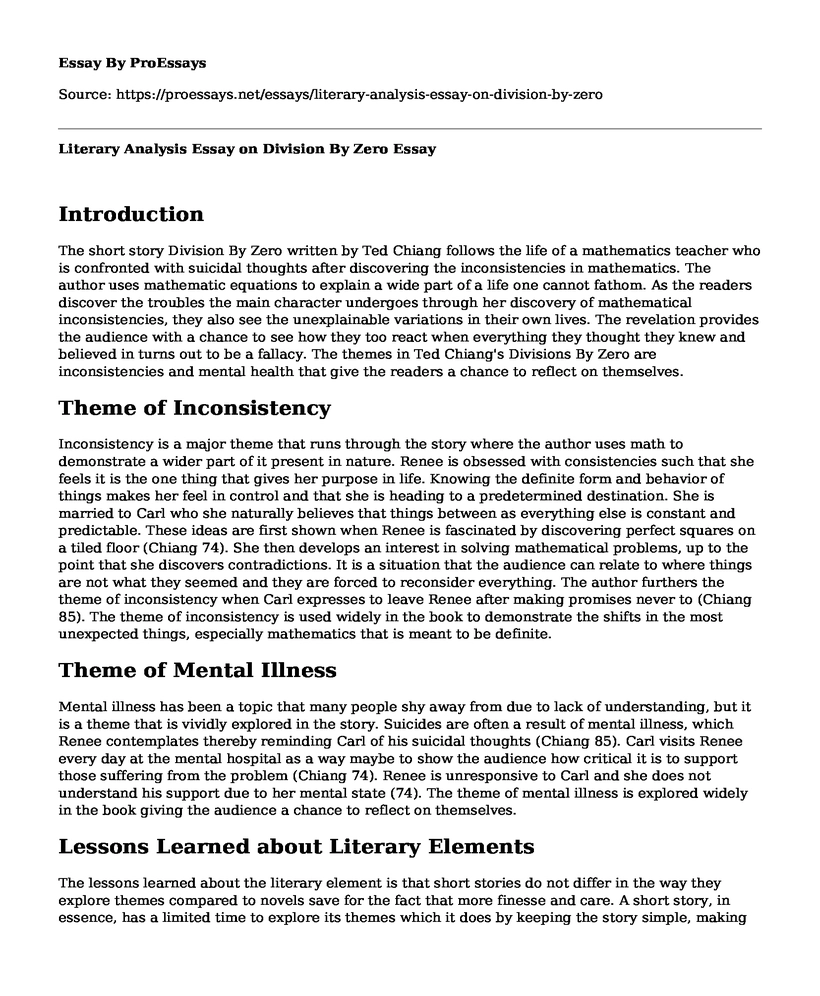Introduction
The short story Division By Zero written by Ted Chiang follows the life of a mathematics teacher who is confronted with suicidal thoughts after discovering the inconsistencies in mathematics. The author uses mathematic equations to explain a wide part of a life one cannot fathom. As the readers discover the troubles the main character undergoes through her discovery of mathematical inconsistencies, they also see the unexplainable variations in their own lives. The revelation provides the audience with a chance to see how they too react when everything they thought they knew and believed in turns out to be a fallacy. The themes in Ted Chiang's Divisions By Zero are inconsistencies and mental health that give the readers a chance to reflect on themselves.
Theme of Inconsistency
Inconsistency is a major theme that runs through the story where the author uses math to demonstrate a wider part of it present in nature. Renee is obsessed with consistencies such that she feels it is the one thing that gives her purpose in life. Knowing the definite form and behavior of things makes her feel in control and that she is heading to a predetermined destination. She is married to Carl who she naturally believes that things between as everything else is constant and predictable. These ideas are first shown when Renee is fascinated by discovering perfect squares on a tiled floor (Chiang 74). She then develops an interest in solving mathematical problems, up to the point that she discovers contradictions. It is a situation that the audience can relate to where things are not what they seemed and they are forced to reconsider everything. The author furthers the theme of inconsistency when Carl expresses to leave Renee after making promises never to (Chiang 85). The theme of inconsistency is used widely in the book to demonstrate the shifts in the most unexpected things, especially mathematics that is meant to be definite.
Theme of Mental Illness
Mental illness has been a topic that many people shy away from due to lack of understanding, but it is a theme that is vividly explored in the story. Suicides are often a result of mental illness, which Renee contemplates thereby reminding Carl of his suicidal thoughts (Chiang 85). Carl visits Renee every day at the mental hospital as a way maybe to show the audience how critical it is to support those suffering from the problem (Chiang 74). Renee is unresponsive to Carl and she does not understand his support due to her mental state (74). The theme of mental illness is explored widely in the book giving the audience a chance to reflect on themselves.
Lessons Learned about Literary Elements
The lessons learned about the literary element is that short stories do not differ in the way they explore themes compared to novels save for the fact that more finesse and care. A short story, in essence, has a limited time to explore its themes which it does by keeping the story simple, making sure every word matters, using repetition, and connecting themes. The themes of mental health and inconsistencies are simple enough for the audience to grasp, thus the story achieves its purpose. Repetition helps in emphasis so that one can undoubtedly know the author's intentions. The stories are meant to make one reflect on themselves such as the way the author does with inconsistencies and mental health as the central themes. Chiang uses mathematics perhaps to show how the most intricate things can still be subject to change, and people should be accommodative of that fact.
Work Cited
Chiang, T. (2016). Arrival (Stories of Your Life MTI). Knopf Doubleday Publishing Group.
Cite this page
Literary Analysis Essay on Division By Zero. (2023, Feb 22). Retrieved from https://proessays.net/essays/literary-analysis-essay-on-division-by-zero
If you are the original author of this essay and no longer wish to have it published on the ProEssays website, please click below to request its removal:
- The Growth of Hamlet: Literary Analysis Essay
- 12 Angry Men: Film Analysis Essay
- Murders Most Foul British Literature Detectives - Article Analysis Essay
- Essay Sample on Exploring the Role of Women in Middlemarch
- The Tragedy of Hamlet: Revenge and Indecision - Research Paper
- Macbeth: An Exploration of Remarkable Character Evolution Through Political Ambition - Essay Sample
- Harry Potter: A Journey From Orphan to Magic World - Essay Sample







